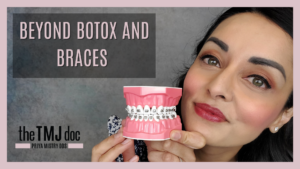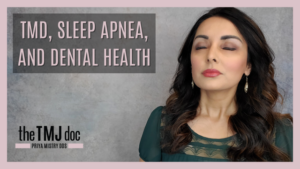A Holistic Look at TMJ, Stress, and Lifestyle Factors with Dr. Priya Mistry
In this thought-provoking episode of The Unclenched Podcast, Dr. Priya Mistry explores the powerful relationship between stress, chronic pain, and TMJ disorders. From sleep deprivation to caffeine, medication side effects to emotional health, she outlines how a range of lifestyle factors can contribute to jaw pain—and more importantly, how patients can regain control through informed care and holistic strategies.
The Vicious Cycle: How Stress and Pain Feed Each Other
One of the core takeaways from this discussion is the self-perpetuating relationship between stress and pain. Stress triggers muscle inflammation and tension, which can intensify existing pain. On the flip side, chronic pain becomes a source of stress and anxiety, creating a loop where each feeds the other.
This physiological and emotional feedback loop can spiral over time, making it harder for the brain and body to distinguish between stress-based pain and injury-based discomfort. Dr. Mistry highlights the importance of addressing both the mental and physical sides of this cycle to achieve meaningful, long-term relief.
Neurology and the Pain Loop: When the Brain Remembers Pain
Dr. Mistry explains how chronic pain isn’t just a physical issue—it’s also deeply neurological. Over time, the brain’s pain pathways become more efficient, meaning the brain registers pain more quickly and more intensely. Emotional centers of the brain, like the amygdala and hippocampus, also become involved, associating pain with fear, anxiety, and past trauma.
This explains why even low-level pain can feel overwhelming for those dealing with chronic conditions. It also underscores the importance of emotional well-being and stress regulation in managing pain—not just treating symptoms at the surface.
Chronic Pain and TMJ: Identifying Triggers and Tracking Patterns
Chronic pain—by definition—is not tied to a singular acute event. Dr. Mistry encourages patients to keep a log of past incidents (such as car accidents, dental work, or emotional trauma) to help identify possible links between past injuries and current TMJ pain.
Working with a trusted healthcare provider who can coordinate referrals to TMJ specialists, physical therapists, or mental health professionals is a key part of a comprehensive treatment plan. Combined with self-care strategies like movement, proper nutrition, and hydration, patients can begin to weaken the pain cycle from multiple angles.
Sleep: The Unsung Hero in Pain and Stress Management
Quality sleep is essential for emotional resilience, physical healing, and pain perception. Unfortunately, chronic stress interferes with sleep—and poor sleep, in turn, impairs emotional regulation and increases pain sensitivity.
Dr. Mistry explains how anxiety elevates heart rate and rumination at night, while depression can cause irregular sleep patterns or sleep-related anxiety. This combination affects the prefrontal cortex, the brain’s command center for rational thought and emotional control. When this system is compromised, pain feels more intense and harder to cope with.
By prioritizing restorative sleep, patients can enhance their ability to manage both stress and discomfort.
Caffeine and TMJ Pain: A Hidden Aggravator
Caffeine—while helpful in moderation—can be a double-edged sword for those managing TMJ pain and stress. High levels of caffeine boost cortisol, a stress hormone, which increases muscle tension and disrupts sleep. For sensitive individuals, even small amounts may amplify stress responses, worsening jaw pain and grinding behaviors.
Dr. Mistry advises patients to monitor their intake, especially during flare-ups, and to be mindful of timing and dosage to prevent unintentional spikes in tension and insomnia.
Medications and Muscle Tension: The SSRI-Bruxism Link
A less commonly discussed contributor to TMJ pain is the side effects of certain anti-anxiety medications, particularly SSRIs (Selective Serotonin Reuptake Inhibitors). These drugs increase serotonin in the brain, which can inhibit dopamine, the neurotransmitter responsible for smooth muscle control.
As a result, patients may experience clenching, bruxing, or even involuntary jaw movements. Dr. Mistry recommends speaking with a physician if symptoms begin after starting an SSRI—there may be alternative medications better suited for individuals with TMJ concerns.
Final Thoughts: Whole-Person Healing for TMJ Pain
TMJ disorders are not isolated issues—they are deeply connected to mental health, sleep, lifestyle, and the body’s overall stress response. Dr. Mistry’s approach to treatment goes beyond mouthguards and muscle relaxers, emphasizing whole-person care and collaboration between disciplines.
By helping patients understand their pain patterns, address stressors, and take proactive steps toward better sleep and emotional health, Dr. Mistry offers a compassionate and empowering path forward for those struggling with chronic TMJ pain.
Dr. Priya Mistry is a TMJ-focused dentist in Vancouver, WA, offering comprehensive care for jaw disorders through neuromuscular dentistry, physical therapy partnerships, and lifestyle guidance. Listen to more insights on The Unclenched Podcast, available on all major platforms.






